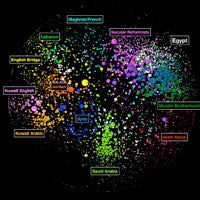A major research project from Harvard Law School’s Berkman Center for Internet and Society’s Internet and Democracy Project has lent enormous insight into the previously unexplored flow of online communication in the Middle East and North Africa. The study, “Mapping the Arabic Blogosphere: Politics, Culture and Dissent,” comes at a time of tremendous political unrest and electronic activism in the Middle East.
The project applied a number of statistical and analytical techniques as well as human coding to a series of more than 6,000 of the most interconnected blogs in the Middle East in order to map the flow of online interaction.
In contrast to a 2008 assessment of the Persian blogosphere, which found that many blogs shared similar religious and cultural connections, this project revealed that blog posts in the Middle East are organized primarily around countries, with personal life and local issues being the most frequently addressed issues. When discussing political issues, bloggers focus primarily on domestic subjects.
The Arab blogosphere is comprised of nearly 35,000 active blogs, and most users link websites such as Wikipedia and Youtube in their blog posts.
These findings were presented at a panel event entitled “Online Discourse in the Arab World: Dispelling the Myths,” hosted by the United States’ Institute of Peace’s Center of Innovation for Science, Technology, and Peacebuilding on June 17, 2009. View webcast.
Several Berkman directors and affiliates were involved in this research, including Project Director Bruce Etling, Morningside Analytics founder John Kelly, Berkman Research Director Robert Faris, and HLS Professor John Palfrey ’01.
